The AMD Ryzen 5 1600X vs Core i5 Review: Twelve Threads vs Four at $250
by Ian Cutress on April 11, 2017 9:00 AM ESTBenchmarking Performance: CPU Encoding Tests
One of the interesting elements on modern processors is encoding performance. This includes encryption/decryption, as well as video transcoding from one video format to another. In the encrypt/decrypt scenario, this remains pertinent to on-the-fly encryption of sensitive data - a process by which more modern devices are leaning to for software security. Video transcoding as a tool to adjust the quality, file size and resolution of a video file has boomed in recent years, such as providing the optimum video for devices before consumption, or for game streamers who are wanting to upload the output from their video camera in real-time. As we move into live 3D video, this task will only get more strenuous, and it turns out that the performance of certain algorithms is a function of the input/output of the content.
7-Zip
One of the freeware compression tools that offers good scaling performance between processors is 7-Zip. It runs under an open-source licence, is fast, and easy to use tool for power users. We run the benchmark mode via the command line for four loops and take the output score.
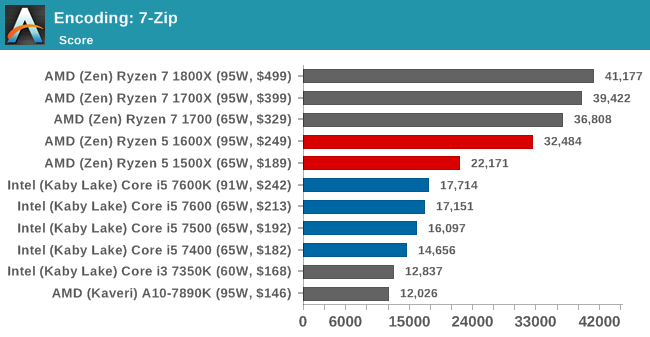
WinRAR 5.40
For the 2017 test suite, we move to the latest version of WinRAR in our compression test. WinRAR in some quarters is more user friendly that 7-Zip, hence its inclusion. Rather than use a benchmark mode as we did with 7-Zip, here we take a set of files representative of a generic stack (33 video files in 1.37 GB, 2834 smaller website files in 370 folders in 150 MB) of compressible and incompressible formats. The results shown are the time taken to encode the file. Due to DRAM caching, we run the test 10 times and take the average of the last five runs when the benchmark is in a steady state.
AES Encoding
Algorithms using AES coding have spread far and wide as a ubiquitous tool for encryption. Again, this is another CPU limited test, and modern CPUs have special AES pathways to accelerate their performance. We often see scaling in both frequency and cores with this benchmark. We use the latest version of TrueCrypt and run its benchmark mode over 1GB of in-DRAM data. Results shown are the GB/s average of encryption and decryption.
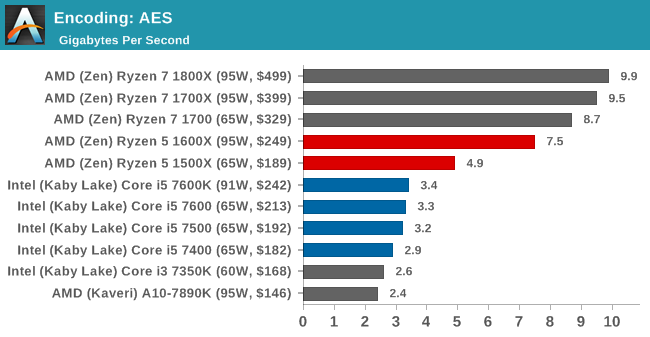
HandBrake H264 and HEVC
As mentioned above, video transcoding (both encode and decode) is a hot topic in performance metrics as more and more content is being created. First consideration is the standard in which the video is encoded, which can be lossless or lossy, trade performance for file-size, trade quality for file-size, or all of the above can increase encoding rates to help accelerate decoding rates. Alongside Google's favorite codec, VP9, there are two others that are taking hold: H264, the older codec, is practically everywhere and is designed to be optimized for 1080p video, and HEVC (or H265) that is aimed to provide the same quality as H264 but at a lower file-size (or better quality for the same size). HEVC is important as 4K is streamed over the air, meaning less bits need to be transferred for the same quality content.
Handbrake is a favored tool for transcoding, and so our test regime takes care of three areas.
Low Quality/Resolution H264: He we transcode a 640x266 H264 rip of a 2 hour film, and change the encoding from Main profile to High profile, using the very-fast preset.
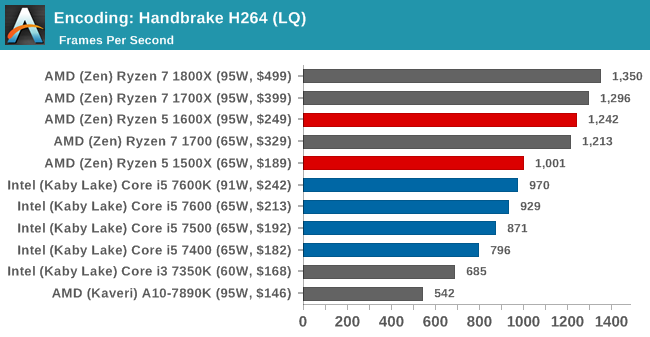
High Quality/Resolution H264: A similar test, but this time we take a ten-minute double 4K (3840x4320) file running at 60 Hz and transcode from Main to High, using the very-fast preset.
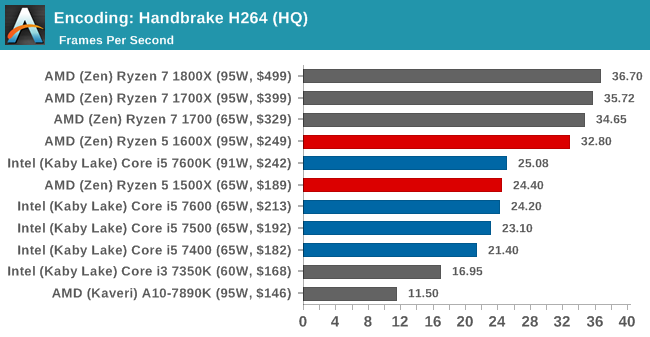
HEVC Test: Using the same video in HQ, we change the resolution and codec of the original video from 4K60 in H264 into 4Kp30 HEVC. This causes a dramatic reduction in filesize (this is a different test to the Ryzen 7 review).
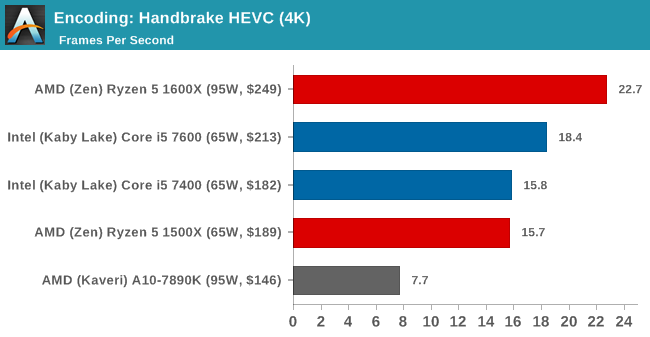


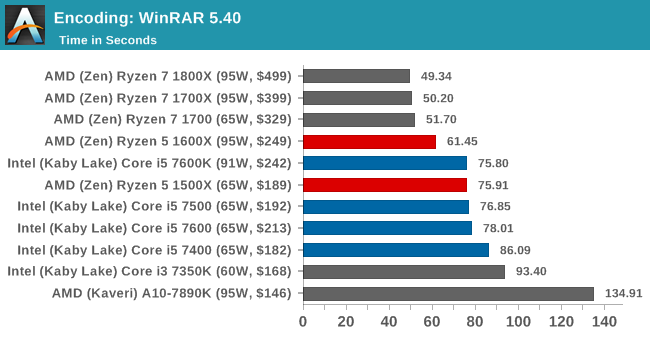








254 Comments
View All Comments
Kamgusta - Tuesday, April 18, 2017 - link
Are you replying to me? I talked about i7-7700 (NOT K), not i7-7700K.Which cope very well with some budget DDR4-2400MHz and a budget H270 board with no penalties whatsoever.
msroadkill612 - Wednesday, May 3, 2017 - link
Interesting. ta for sharing. pretty awesome price for the 1600/mobo bundle.How did the intel mobo compare for functionality do u think?
loguerto - Friday, April 21, 2017 - link
9 is not prime :)LawJikal - Friday, April 21, 2017 - link
What I'm surprised to see missing... in virtually all reviews across the web... is any discussion (by a publication or its readers) on the AM4 platform's longevity and upgradability (in addition to its cost, which is readily discussed).Any Intel Platform - is almost guaranteed to not accommodate a new or significantly revised microarchitecture... beyond the mere "tick". In order to enjoy a "tock", one MUST purchase a new motherboard (if historical precedent is maintained).
AMD AM4 Platform - is almost guaranteed to, AT LEAST, accommodate Ryzen "II" and quite possibly Ryzen "III" processors. And, in such cases, only a new processor and BIOS update will be necessary to do so.
This is not an insignificant point of differentiation.
systemBuilder - Friday, April 28, 2017 - link
I believe the Ryzen core is 20% slower than the Intel core, in instructions per clock. A hyperthread is only about 30% as fast as a full core. With both of these factors thrown in, 6 Ryzen Cores = 5 Intel cores. So the advantage of Ryzen is actually miniscule. It's why I sold all of my AMD stocks in February.willis936 - Thursday, July 27, 2017 - link
"sold all of my AMD stocks in February"I'm cringing.
systemBuilder - Friday, April 28, 2017 - link
Ryzen's cores are 20% slower than Intel's. A hyperthread is only worth (at best) 30% as much as a full core. Therefore, Intel offers 4 cores, AMD offers 6 * 0.8 * 1.3 = 6.24 cores, a decent bump but obviously not significant because few if any games are set up to use more than 8 cores, which in the best case for AMD would be (6 + 0.3 + 0.3)*0.8 = 5.28 cores, a small bump.Cooe - Monday, March 1, 2021 - link
Except Zen 1 was only about ≈5% slower in IPC vs Kaby Lake, not 20%...msroadkill612 - Monday, May 1, 2017 - link
Some thoughts from a ~newb, are that if 8 cores are the new black, then maybe 16GB (or 2GB per core) of ram, isnt as generous as it seems?Also, its a new paradigm. Tasks which taxed the cpu and thus historically avoided (software raid e.g.), can now be embraced with ~impunity.
"Normal" CPUs can handle 16 jobs before a queue forms, commonly, an increase by a factor of 8 for a prospective upgrader.
Gothmoth - Tuesday, May 2, 2017 - link
"...affords a comfortable IPC uplift over Broadwell....."yeah does it?
what is comfortable??.... 10%.... who are you trying to kid here?